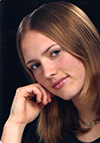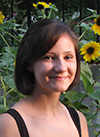Mudd Chemists Get Big Reactions
April 2, 2014Harvey Mudd College was well represented at the 2014 National Meeting of the American Chemical Society in Dallas recently, as students took home two honors related to undergraduate chemistry.
Chemistry major Sara Tweedy ’15 received the Best Poster Award in the Division of Computers in Chemistry. Creating molecular dynamics simulations involving the NSD1 gene, Tweedy uses classical mechanics to model the motion of the auto-inhibitory loop of NSD1, mutations of which play a role in diseases such as Sotos syndrome and in some cancers. Her future research will focus on understanding the molecular basis for the transitions between different loop conformations.
To continue her work in computational chemistry and biomedicine, Tweedy plans to enter a PhD program or medical school, “which would be great for applying these computational techniques to translational medicine and research that [in turn] translates to medical treatments,” she said. Tweedy’s research advisor is Harvey Mudd Professor of Chemistry Robert Cave.
“Sara does a tremendous job of translating the complexity of protein structure into accessible and testable models,” remarked Cave. “It was evident at the poster session that she could field whatever questions were thrown at her.” Cave also noted that Tweedy’s award was in the general computational chemistry poster session rather than the undergraduate session.
Also at the event, Marie Kirkegaard ’15 was presented with the Outstanding Student Award from the 2013 Nuclear and Radiochemistry Summer School. This award recognizes strong aptitude in and enthusiasm for nuclear science among undergraduates, usually seniors. An Individual Program of Studies major in chemical physics, Kirkegaard is the first junior to receive the award.
“Harvey Mudd does not offer research opportunities in nuclear chemistry,” noted Cave, who also advises Kirkegaard. “But Marie managed to find positions last summer and this coming summer working in the field. That sort of devotion to a subject is thrilling to see and has helped her excel.”
Kirkegaard was among just 24 students chosen to participate in the ACS-sponsored summer school program, which offers an all-expenses-paid, six-week course in nuclear and radiochemistry for which students receive credit. This summer, she will work with a theoretical nuclear physics research team at the University of Washington before returning to complete her course work at Harvey Mudd in 2014–2015.
The Harvey Mudd chemistry department is committed to challenging curriculum and extensive hands-on experience with modern instrumentation and computation, and provides a broad-based education with an emphasis on problem-solving skills. The department’s robust research program—more than 80 percent of chemistry majors conduct research prior to their senior year—gives students a leading role in solving problems and independence in guiding the direction of the project. The Harvey Mudd chemistry major is certified by the American Chemical Society.
The American Chemical Society is a nonprofit organization chartered by the United States Congress. With more than 161,000 members, ACS is the world’s largest scientific society and a global leader in providing access to chemistry-related research.


